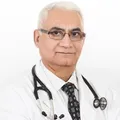Best Neurologists in Delhi
Filter By :
Total 93 Neurologists Found in Delhi
Top 10 Neurologist in Delhi
Below are the top 10 Neurology doctors in Delhi based on their overall experience and rating.
Neurologists in Delhi
Delhi is home to a large number of highly qualified and well-established neurologists. These medical specialists focus on the diagnosis and treatment of nervous system problems, which include the brain, spinal cord, and peripheral nerves.
Patients in Delhi benefit from the knowledge of these specialists, who provide personalised treatment programmes to help people with neurological illnesses.
Becoming a Neurologist in Delhi
Neurologist in Delhi requires a rigorous educational and training path. Here is the step-by-step guide:
Undergraduate Education: Begin by earning a Bachelor of Medicine and Bachelor of Surgery (MBBS) degree. It normally takes five and a half years to complete in India.
Internship: Following the completion of your MBBS, you must do a one-year mandated internship at a recognised medical institution or hospital.
Postgraduate Education: Enrol in a Doctor of Medicine (MD) or Diplomate of National Board (DNB) program in neurology. This is a three-year specialised postgraduate course focusing on neurology.
Licensing: To practise as a physician, you must first obtain a medical licence from the Medical Council of India (MCI) or the Delhi Medical Council.
How to Choose The Best Neurologists in Delhi?
Choosing the best neurologist in Delhi is an important decision for your health. Here are some ways to help you make an informed choice:
Referrals: Ask your family or friends who are familiar with neurologists in Delhi for recommendations. Word-of-mouth referrals are often a reliable starting point.
Research Credentials: Examine the neurologist's qualifications and certifications. Check that they are members of the Medical Council of India (MCI) or the Delhi Medical Council.
Specialisation: Neurology is a large field with several subspecialties, like clinical neurophysiology and neuro-oncology. Consider your particular ailment and seek out a neurologist who specialises in it.
Experience: Inquire about the neurologist's years of practice and the number of individuals they've treated with similar ailments to yours.
Patient Testimonies: Where accessible, read online patient reviews and ratings. These can provide information on the neurologist's patient care and communication skills.
When Should I See a Neurologist in Delhi?
Seeing a neurologist in Delhi is essential when you experience symptoms or conditions related to the nervous system or brain. Here are some pointers on when to consult a neurologist:
Persistent Headaches: If you get frequent or severe head pain, you should see a neurologist for correct diagnosis and treatment.
Seizures: If you or someone you know has had seizures, you must contact a neurologist to discover the reason.
Numbness or Tingling: Persistent unusual acts in any part of your body may indicate nerve or neurological disorders.
Memory Loss, Confusion, or Cognitive Decline: These may be symptoms of neurological diseases such as Alzheimer's disease (cause of brain shrinkage) or other forms of dementia (inability to remember or think).
Chronic Pain: Ache that does not respond to traditional treatments may have a neurological basis.
Common Diseases Treated by a Neurologist in Delhi
Numerous neurological conditions are diagnosed and treated by neurologists in Delhi. Here are some common conditions treated by neurologists in the city:
Headaches and Migraines: By determining triggers, neurologists assist patients in obtaining relief from chronic headaches. Migraine involves severe, throbbing headaches often accompanied by symptoms like nausea. Neurologists help patients manage migraine triggers and provide both preventive and acute treatments.
Epilepsy: They are experts in the diagnosis and management of this persistent seizure-causing disorder.
Stroke: Since these are brought on by a disruption in blood flow to the brain, neurologists must assess patients quickly and intervene when necessary.
Multiple Sclerosis (MS): These doctors diagnose and treat this chronic autoimmune illness affecting the central nervous system.
Parkinson's Disease: This is a progressive neurological disorder characterised by tremors and muscle rigidity.
Alzheimer's Disease: It is a degenerative brain condition leading to memory loss, cognitive decline, and behavioural changes.
Note: These are not the only disorders treated by neurologists.
Types of Tests Recommended by Neurologists in Delhi
Neurologists in Delhi may recommend various diagnostic tests and procedures to assess and diagnose neurological conditions. Here are the common tests recommended by neurologists in Delhi:
Computed tomography (CT Scans): They are used to see into the brain and find anomalies such as tumours, haemorrhages, or structural problems.
Magnetic Resonance Imaging: A thorough view of the brain, spinal cord, and surrounding structures is provided by an MRI scan.
Electroencephalogram, or EEG: This test captures electrical activity in the brain and is helpful in the diagnosis of epilepsy and other seizure disorders like epilepsy.
Nerve Conduction Studies: Neuropathy and other disorders like nerve damage can be diagnosed with NCS. It examines the strength and speed of electrical signals in the nerves.
Electromyography, or EMG: This is a diagnostic tool for neuromuscular disorders as it evaluates the function of the nerves that govern the muscles.
Angiography: A medical imaging procedure used to visualise blood vessels, particularly in the brain (cerebral angiography) or other body parts.
Myelography: A diagnostic procedure used to examine the spinal cord and nerves by injecting a contrast dye into the spinal canal.
Common Procedures Done by Neurologists in Delhi
Neurologists in Delhi undertake several procedures to diagnose and treat neurological conditions. Here are the common procedures performed by neurologists in Delhi:
Electroencephalography (EEG) captures electrical activity in the brain and aids in identifying seizures, epilepsy, and other abnormalities of the brain like dementias.
Nerve Conduction Studies (NCS) and Electromyography (EMG) help in the diagnosis of neuromuscular diseases like spinal muscular atrophy and peripheral neuropathies (when the nerves outside the spinal cord & brain get damaged). EMG analyses muscle activity, and NCS evaluates nerve function.
Lumbar Puncture (Spinal Tap) involves the collection of cerebrospinal fluid to diagnose conditions like multiple sclerosis (a potentially crippling brain and spinal cord disorder).
Botox Injections are a treatment option for diseases like stiffness and persistent migraines.
Deep Brain Stimulation (DBS) treats movement disorders such as Parkinson's disease. In this procedure, electrodes in the brain are surgically implanted.
Vagus Nerve Stimulation (VNS) involves implanting a device that stimulates the vagus nerve (primary nerves of the parasympathetic nervous system) to cure depression and epilepsy (repeated seizures).
Is Neurology Treatment in Delhi a Good Option to Consider?
Neurology treatment in Delhi is an excellent choice to consider. The city is home to an abundance of highly skilled and experienced neurologists. These professionals provide complete care for patients with neurological illnesses.
The healthcare infrastructure in Delhi is well-regarded. The presence of NABH-accredited hospitals in Delhi with innovative technology improves the quality of neurological treatment even further.
Takeaway
Delhi is a wise choice for those in need of expert care for neurological conditions. Looking to find the best neurologist in the city? HexaHealth can assist you with it!
FAQs
What is the basic consultation fee of a neurologist in Delhi?
The consultation fee of aneurologist in Delhiis around ₹800 to ₹2500. It may vary depending on the doctor's location, services, qualifications and experience.
What is the basic consultation fee of a neurologist in Delhi?
The consultation fee of aneurologist in Delhiis around ₹800 to ₹2500. It may vary depending on the doctor's location, services, qualifications and experience.
What are the success rates of neurology procedures in Delhi?
Success rates of neurology procedures in Delhi can vary widely depending on the specific procedure and the medical team's expertise. Success rates for routine procedures, such as diagnostic tests or headache management, are generally high. For complex procedures like brain surgery or deep brain stimulation, success rates can also be quite promising.
How often should I follow up with the neurologist in Delhi?
The frequency of follow-up visits with a neurologist in Delhi depends on your specific neurological condition and treatment plan. It can generally range from every few months to once a year or as needed.
What is the cost of neurology procedures in Delhi?
The cost of neurology procedures in Delhi varies depending on the type of procedure and the hospital/clinic where it is performed. The costs include:
- Deep Brain Stimulation Surgery Cost in Delhi - ₹3,00,000 - ₹15,00,000
- Brain Aneurysm Surgery Cost in Delhi - ₹1,60,000 - ₹3,00,000
- Craniotomy Surgery Cost in Delhi - ₹2,75,000 - ₹4,00,000
- Vagus Nerve Stimulation Cost in Delhi - ₹2,50,000 - ₹5,00,000
How can I prepare for my appointment with a neurologist in Delhi?
By following the below steps, you can ensure that your appointment with the neurologist in Delhi is productive and informative:
Organise your medical history and records.
List your current medications and allergies.
Prepare a list of questions and concerns.
Be prepared to describe your symptoms in detail.
Be honest and open about your medical history.
Do neurologists in Delhi offer consultations at home?
Yes, some neurologists in Delhi offer home consultations, but this may depend on the individual neurologist and the patient's condition. It's best to inquire about home consultation options with the specific neurologist.
Who are the best Neurologists in Delhi?
Best Neurologists in Delhi are:
Who are the top 10 Neurologists in Delhi near me?
| Doctor Name | Reviews | Ratings | Experience |
| Dr. KB Hasti | 90 | 95% | 55 Years |
| Dr. R M Dhamija | 95 | 98% | 54 Years |
| Dr. Veena Kalra | 85 | 100% | 54 Years |
| Dr. Vijay Chandra | 98 | 99% | 50 Years |
| Dr. Pushpendra Nath Renjen | 87 | 98% | 50 Years |
| Dr. Madhuri Behari | 96 | 96% | 49 Years |
| Dr. Rajesh Garg | 96 | 97% | 48 Years |
| Dr. P K Sethi | 96 | 97% | 48 Years |
| Dr. G S Kocher | 95 | 97% | 47 Years |
| Dr. Manvir Bhatia | 98 | 96% | 46 Years |
How to find a top Neurologist in Delhi?
Go to the search section of HexaHealth. Select your city as Delhi and specialisation as Neurologist. Choose from the list of Neurologists in Delhi who have maximum recommendation and reviews.
Who is a Neurologist in Delhi?
A Neurologist is a specialist doctor in Delhi who performs the treatments and procedures to prevent the complications of various diseases under the Neurology department.
Which hospital is best in Delhi for Neurologist?
There are govt. and private hospitals for Neurologist in Delhi. However, you can get the Neurology hospitals in Delhi list and choose the best as per their recommendation and reviews.
Book Free Appointment































